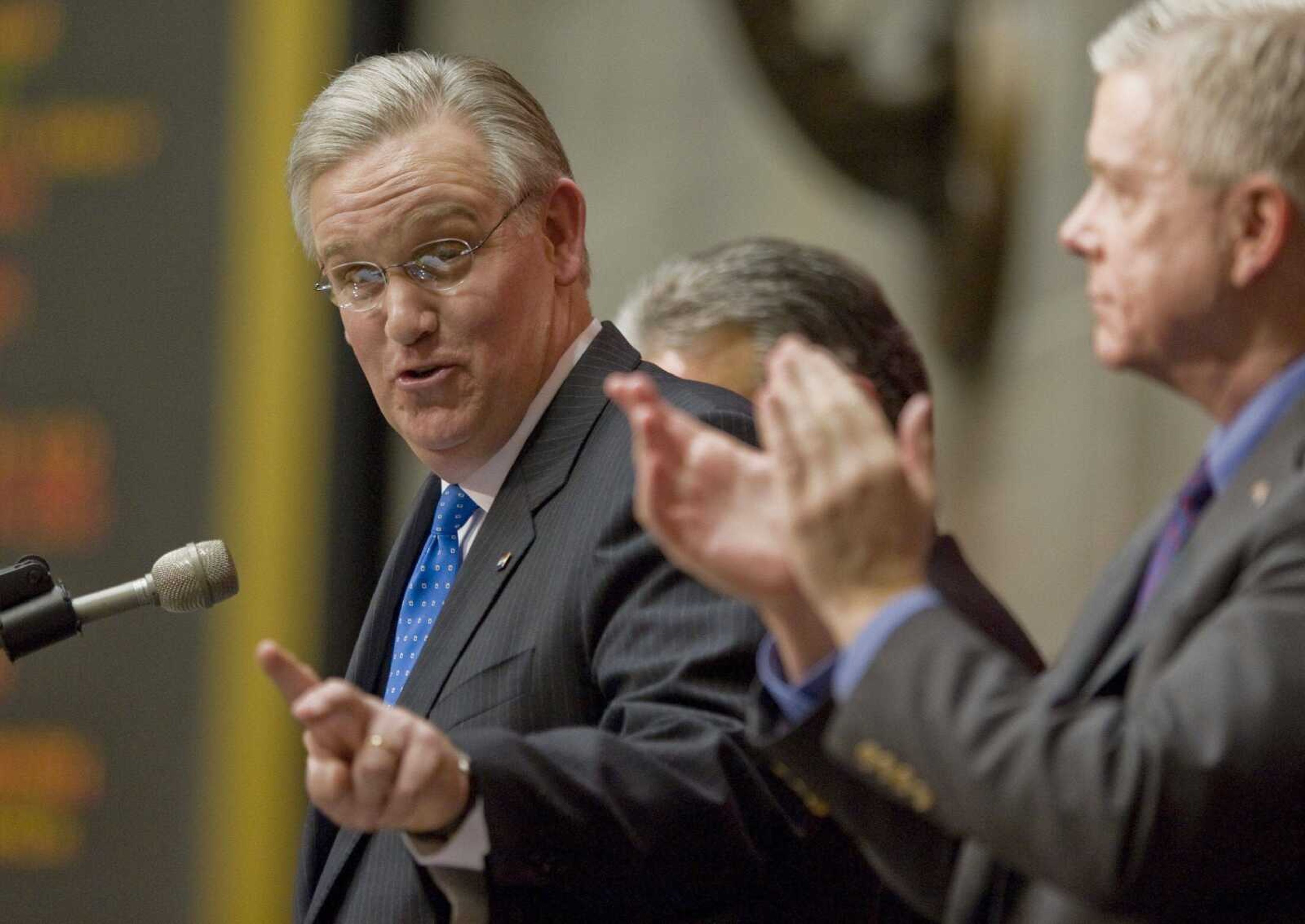'We' vs. 'he': Nixon, Kinder strike opposite tones in speeches
JEFFERSON CITY, Mo. -- For Gov. Jay Nixon, the State of the State address was about "we." For Lt. Gov. Peter Kinder, it was about "he." Missourians who watched or listened to Nixon's second-ever State of the State speech last week heard a lot references about "working together" -- often referring to the relationship between the Democratic governor and Republican-led legislature...
JEFFERSON CITY, Mo. -- For Gov. Jay Nixon, the State of the State address was about "we." For Lt. Gov. Peter Kinder, it was about "he."
Missourians who watched or listened to Nixon's second-ever State of the State speech last week heard a lot references about "working together" -- often referring to the relationship between the Democratic governor and Republican-led legislature.
Those who then listened to Kinder's official Republican response heard a lot of criticism of Nixon, including an assertion that Nixon had not worked together with Republicans.
It was stark contrast that highlights the political realities of Missouri's top two executives. If he wants to accomplish much, Nixon needs the help of Republican lawmakers. Yet Kinder, a Cape Girardeau native who is expected to run against Nixon in 2012, needs fellow Republicans to stand up to the Democratic governor.
George Connor, who is chairman of the political science department at Missouri State University, watched both speeches with his eyes and ears attuned to the similarities and differences in the general approach taken by Nixon and Kinder.
"Governor Nixon was trying hard to not be political, to speak to the regular voter, to speak to the people of Missouri in fairly broad terms about his vision for the state over the next year," Connor said.
"And I think Lieutenant Governor Kinder was very specifically talking to partisans," Connor added. "He was pushing all of the buttons that needed to be pushed to galvanize the Republican base and talk to those people who aren't already on board."
Just how different were the speeches?
Nixon made more than 200 mentions of "we," "us," "our" or "together" in his less than 50-minute speech. Perhaps not surprisingly, he mentioned Kinder only once -- to acknowledge Kinder's presence next to him on the House dais.
Kinder made nearly 50 references to "we," "us," "our" or "together" -- a usage that was fairly proportionate to Nixon's considering Kinder's speech was less than 10 minutes long. But Kinder, who delivered his speech in a separate room without Nixon present, referred to Nixon 40 times -- either as "Governor Nixon," "the governor" or "he."
That equals at least one reference to Nixon every 15 seconds. And none of those references were complimentary.
Kinder criticized Nixon's handling of federal stimulus money, the state budget, tax refunds, education, economic development, vehicle license offices, health care and the E. coli controversy involving the Lake of the Ozarks -- to name more than few.
When Kinder used inclusive pronouns such as "we," they often were meant to exclude Nixon. He noted that Republicans, whom he described as "we," have opposed Nixon's wrong policies. Or Kinder cast himself with "we" the people in opposition to what Nixon was doing.
By contrast, Nixon's frequent use of "we" and "our" was meant to emphasize the bipartisan collaboration among his administration and lawmakers -- both during his first year in office and, he hoped, in 2010.
Looking out over nearly 200 seated lawmakers, Nixon lauded how "we" worked together to balance the budget without tax increases, pass economic development legislation, boost higher education funding for health care professionals and freeze college tuition rates -- to name more than a few.
Then Nixon used "we" to highlight all the things that could be accomplished together in 2010, such as the passage of autism insurance legislation, ethics reforms and more economic development incentives.
"Let's make 2010 the year we put politics second, and put Missouri first," Nixon concluded.
That could be a quite a challenge, because 2010 is an election year. All 163 House seats and half of the 34 Senate seats will be on the ballot this November. And while governor's office is not up for election, a competitive race for an open U.S. Senate seat will focus a lot of national political attention on Missour
Connect with the Southeast Missourian Newsroom:
For corrections to this story or other insights for the editor, click here. To submit a letter to the editor, click here. To learn about the Southeast Missourian’s AI Policy, click here.








